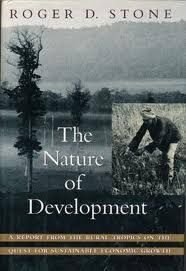Synopsis
A few years ago, Roger Stone undertook a formidable challenge: to travel to representative villages in the tropical corners of the developing world to see how and whether economic development plans had improved the quality of the people's lives while also preserving each region's rich plant and animal life. In The Nature of Development, Stone reports on his findings and offers a lively prescription for sustainable economic growth that is environmentally sane and economically sound.
By commercial and missionary airplane, bus, off-road vehicle, and dugout canoe--and of course by means of wearying foot journeys--Roger Stone reached his far-flung destinations all over Latin America, Asia, and Africa. Once there, he lived, walked, and talked at length with many diverse peoples: the Awa of Ecuador and Colombia; the Oku, who live near Kilum Mountain in Cameroon; the Hatam of the Arfak Mountains in Indonesia's Irian Jaya province; the resourceful, if underequipped, wardens of Zambia's national park service; the fishermen and farmers of a St. Lucia that Caribbean tourists seldom discover.
While in the Amazon basin, he found sad tales of people without a future and of relentless environmental losses. More often, though, he returned with stories of hope and encouragement. For, as The Nature of Development shows, conservation and economic-development agencies can work together, and the governments of poor and rich countries alike can cooperate to improve human lives and stop disastrous ecological losses in the world's richest habitats. As new imperatives replace the global preoccupation with warfare and reckless modes of development, Stone's book carries a resonant and important message about how we have mistreated our habitats in the past and how we can achieve a new environmental world order.
Reviews
Stone (a consultant on environmental issues at the Council on Foreign Relations) explicates sustainable growth, a ``hot topic'' in relations between rich and poor nations. According to the author, ``while environmental degradation in the industrial world results from affluence and neglect, in developing countries the principal culprit is poverty.'' So Stone's prescription for defending the environment in poor areas calls for involving local people in environmentally benign economic development that will keep them from having to destroy the land in order to survive. After presenting a brief history of the European impact on the ecologies of Asia, Africa, and Latin America, Stone documents the growing worldwide support for sustainable development, initially among First World government and conservation organizations (like the World Wildlife Fund, where he is a senior fellow), then among the poor, who rapidly take to the concept when they see its benefits. The author's accounts of visits to various development sites mix crisp descriptions (particularly of local political situations) with seemingly irrelevant details (like that of the French woman who showed him to his rental car). Although clearly hailing from the liberal-environmentalist wing of the development aid community, Stone represents all sides fairly in dealing with private and public initiatives, and his comments will be particularly useful for First World environmentalists trying to understand why their counterparts in poor countries often resist their best-intentioned efforts. Though Stone sometimes seems to prefer quick judgment to deep analysis, he presents a compelling picture of a major shift in worldview among development agencies and their clients, one that may result in a healthier planet. -- Copyright ©1992, Kirkus Associates, LP. All rights reserved.
Economic growth and environmental security are elusive goals. Only recently have policymakers recognized that the failure of many international development efforts has deepened the poverty of millions of people, who, in turn, have placed an extra stress on conspicuous aspects of our global environment--cutting trees for meager profits or overfishing streams and lakes for food. Stone, of the World Wildlife Fund, reviews these trends, drawing on personal observations and evidence from dominant development and environmental organizations that have also contributed to the problems. Some hopeful signs are offered of grassroots initiatives in the Third World. This book is a useful introduction for general audiences, but the many vocal Third World critics with whom Stone does not agree are too easily dismissed or ignored. An optional purchase.
- Bill Rau, Takoma Park, Md.
Copyright 1992 Reed Business Information, Inc.
"About this title" may belong to another edition of this title.
